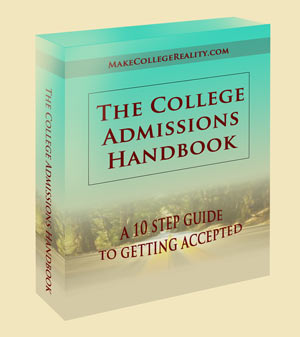 Putting off writing your essays? They can be the hardest part of your application. It’s the only time you don’t just fill in information. But if you think about it, it’s still all about you - this time in your own words. This is your chance to set yourself apart from the other applicants.
Putting off writing your essays? They can be the hardest part of your application. It’s the only time you don’t just fill in information. But if you think about it, it’s still all about you - this time in your own words. This is your chance to set yourself apart from the other applicants.
What can you offer? Each person a college accepts is an investment for them. The reason colleges want to attract the best students is because they have a reputation to keep. What characteristics do you have that a college would be interested in? How can you convey that through your essay?
Don’t rewrite your resume. You may be tempted to try to impress the admissions officers with your many activities. Don’t fall into that trap! They can already see all that information in the rest of your application. The essay is your chance to show them a piece of your personality. Weave in one or two activities into your essay if you can, but don’t make your first priority.
Steer clear of popular topics. If you write about the first thing that comes to mind, chances are a thousand other people have written about a similar topic. Make sure you tell a story only you can tell.
Research the college. Each school has its own culture – how would you fit into it? If the school is environmentally conscious, you might want to talk about your involvement in a recycling project instead of your part in a school play. If you’re applying to an engineering school, tell them about a class you’d be interested in or a professor you’d like to do research with. These details will show the admissions officers that you are genuinely interested in their school.
Write a story. No matter what the essay question asks, you have to start with an interesting topic. Think about writing a story instead of just answering the question. A good place to start is to think of an inspirational person in your life. Maybe your coach has motivated you in a way no one else has. Or perhaps you look up to your grandmother who helped raise you. What characteristics do you admire about this person? Why? How have they shaped who you are now?
What’s your passion? Whether you’re passionate about an after school job or collecting baseball cards, you’ll write a more compelling essay about something you really love. Don’t get caught up in trying to amaze the admissions officers with the activity you think is most impressive if you’re more interested in something else.
What have you learned? Think about a time you failed and what you learned from that experience. Perhaps you were devastated you didn’t make the cut for a sports team but afterword you realized it opened a new opportunity. Maybe your attempt to start a club failed, but you later advised other students how to start a club. Whatever your failure is, the point is to show them how you pick yourself up when things don’t go your way.
Don’t be whiny. The point of the essay is not for the admissions officers to feel bad about you, but to show them how excited and prepared you are to go to their school. If you want to talk about a disease or disability you may have, don’t talk about the challenges you’ve faced, but rather how you’ve overcome the obstacles. Let them know it hasn’t stopped you from enjoying life to the fullest.
Less is more. Once you choose a topic, keep it focused. If you love to dance, talk about one specific performance. If you like to go fishing with your dad, focus on one moment the two of you had that brought you closer. The more focused you are, the more detail you can include and the more interesting your essay will be.
Get to the point. It’s important to include details in your story, but make sure they serve a purpose. If you’re writing about your brother’s teacher’s aunt’s childhood best friend Abby who inspired you to take up ballet, that long list of people doesn’t add anything to your story. Instead, just refer to Abby as a family friend. If your third grade teacher is an important part of your story but you can’t remember her name, just give her one instead of dwelling on the fact that you can’t remember or throwing out the story all together. This will keep your story focused and the people reading your essay won’t know the difference. This doesn’t mean you should make up a story or use someone else’s story as your own – it’s just a way to make your story clearer.
To tell a good story you don’t actually tell, you show. Let’s say you’re writing about the time your dad taught you how to hold a baseball bat. You might be tempted to say something like, “When I was 5 years old, my dad showed me how to hold a bat. That’s when my love for baseball started.” Instead of telling the reader about this experience, show them. You might say something like this: “My fingertips could barely reach my thumbs when I wrapped my hands around the bat. My dad gently twisted my hands so my knuckles lined up and he stepped back to toss the baseball. I remember thinking, ‘I must look like Kirby Puckett when he was a kid.’ Twelve years later, I still imagine that I look like famous baseball players when I step up to the plate.” Do you see how the second example created an image? Telling just states the facts; showing creates a picture.
All this brainstorming, writing and editing takes time, so start early. Have a teacher, friend, or parent take a look at your essay before you send it off. Ask them if it sounds like a story you would tell and have them point out any parts that don’t make sense. As they say, Rome wasn’t built in a day. And your essay shouldn’t be either.
>>Stuck? How to start your college admissions essay
Prepare
Apply
Before you start
Choosing a college
Recommendations
Essays
Paying for college
Succeed


